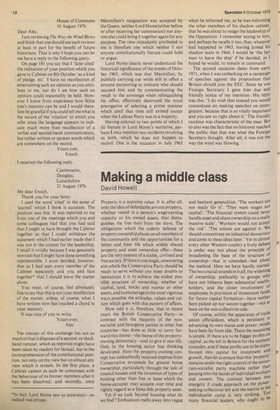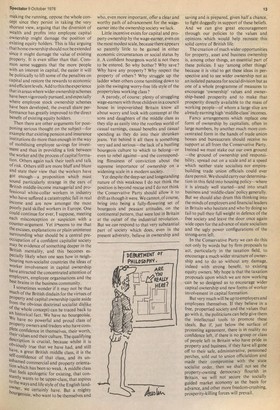Making a middle class
David Howell
Property is a supreme value. It is, after all, only the idea of defendable private property, whether vested in a person's wage-earning capacity or his owned assets, that distinguishes the free man from the slave. The obligations which the orderly defence of property ownership places on all members of the community and the opportunities for a better and freer life which widely shared property and asset ownership offer—these are the very essence of a stable, civilised and free society. If there is one single, unwavering aim which the Conservative Party should be ready to serve without any inner doubts or hesitations it is to achieve the widest possible structure of ownership, whether of capital, land, bricks and mortar or other assets, and to encourage in the most vigorous ways possible the attitudes, values and culture which goes with this pattern of affairs.
How odd it is, therefore, that in recent years the British Conservative Party— in contrast with the majority of the nonsocialist and bourgeois parties in other free countries—has done so little to carry forward this theme —the theme of the propertyowning democracy—and to give it new life. Only in the housing sector has thinking developed. Here the property-owning concept has undoubtedly received impetus from Conservative proposals for greater home ownership, particularly through the sale of council houses and the invention of types of holding other than free or lease which the home-occupier may acquire over time and rightly regard as a bona-fide property asset.
Yet if we look beyond housing what do we find ? Enthusiasm melts away into vague and hesitant generalities. 'The workers are not ready fOr it'. 'They want wages nnt capital'. 'The financial system could never handle asset and share ownership on a reallY massive scale'. 'Workers would not accent the risk'. 'The unions are against it. We should concentrate on industrial democracy and come to these ideas later.' Yet in almost every other Western country a lively debate is under way not about the principle of broadening the base of the structure of
ownership—that is conceded but about the method. Here we have hardly started. The two crucial strands in it all, the widening of ownership, preferably to groups who have not hitherto been substantial wealth-. holders, and the closer involvement of employees in provision of investment funds for future capital formation--have neither been picked up nor woven together—not at least on the non-collectivist side.
Of course, within the apparatus of trade union officialdom, which is persistent in advancing its own status and power, minds have been far from idle. There the reasoning is simple. If there are to be bigger profits on capital, as the left in Britain for the moment concedes, and if these profits are to be transformed into capital for investment an growth, then let us ensure that this 'propertY remains under the tight control of the unioncum-socialist party machine rather than passing into the hands of individual workers and owners. The contrast between this energetic if crude approach on the powerseeking collectivist left and the inertia in the individualist camp is very striking. 1019 many financial leaders, who ought to be
making the running, oppose the whole concept since they persist in taking the very shortest view, arguing that the diversion of wealth and profits into employee capital ownership might damage the position of existing equity holders. This is like arguing that home ownership should not be extended since it might damage the value of existing Property. It is even sillier than that. Common sense suggests that the more people With an interest in capital, the easier it will be politically to lift some of the penalties on capital and restore the rewards to economic and efficient levels. Add to this the experience that in areas where wider ownership schemes have been vigorously pursued, and especially Where employee stock ownership schemes have been developed, the overall share performance has greatly improved to the direct benefit of existing equity holders.
Then there are other arguments for postponing serious thought on the subject—for example that existing pension and insurance institutions do more than enough in the way of mobilising employee savings for investment and thus in providing a link between the worker and the process of capital formation. Others again suck their teeth and talk Of risk. Others still are more bluff and blunt and state their view that the workers have got enough—a proposition which must sound particularly strange in the ears of British middle-income managerial and professional white-collar workers in industry Who have suffered a catastrophic fall in real income and are now amongst the most Poorly paid skilled workers in Europe. One could continue for ever, I suppose, meeting each misconception or suspicion with a counter-argument. Yet itsseems to me that the excuses, explanations or plain uninterest surrounding what should be a central preoccupation of a confident capitalist society may be evidence of something deeper in the British mentality, and this becomes esPecially likely when one sees how in neighbouring non-socialist countries the ideas of worker involvement in capital ownership have attracted the concentrated attention of employers, employee organisations and the best brains in the business community. I sometimes wonder if it may not be that much of the British disdain for the virtues of Property and capital ownership (quite aside from the obvious doctrinal socialist dislike of the whole concept) can be traced back to ari historical fact. We have no bourgeoisie. We have no powerful and proud class of Property owners and traders who have comPlete confidence in themselves, their worth, their values and their culture. The qualifying description is crucial, because whilst it is Obviously true that we have had, and still have, a great British middle class, it is the self-confidence of that class, and its unashamed commercial and property orientat_lon which has been so weak. A middle class that feels apologetic for existing, that con
St wants to be upper-class, that aspires o
the ways and life style of the English land We certainly have. But a mighty Oourgeoisie, who want to be themselves and
who, even more important, offer a clear and worthy path of advancement for the wageearner into the ownership society we lack.
Little incentive exists for capital and property ownership by the wage-earner, even on the most modest scale, because there appears so patently little to be gained in either economic circumstances or social status by it. A confident bourgeois world is not there to be entered. So why bother? Why save ? Why have any property? Why respect the property of others? Why struggle up the ladder when others come tumbling down to join the swinging worry-free life style of the propertyless working class ?
A parody, of course: plenty of struggling wage-earners with three children in a council house in impoverished Britain know all about worry and look with contempt at the sons and daughters of the middle class as they slip as easily into the rootless world of casual earnings, casual benefits and casual spending as they do into their shrunken jeans. Yet behind it all there is something very sad and serious—the lack of a bustling bourgeois culture to which to belong—or even to rebel against—and the corresponding flimsiness of conviction about the supreme importance of ownership on a widening scale in a modern society.
Yet despite the deep-set and longstanding nature of this weakness I do not think the position is beyond rescue and I do not think the Conservative Party should allow it to drift as though it were. We cannot, of course, bring into being a fully-flowering set of bourgeois and peasant attitudes, on the continental pattern, that were lost in Britain at the outset of the industrial revolution. But we can respond to that very substantial part of society which does, even in the present adversitY, believe in ownership and saving and is prepared, given half a chance, to fight doggedly in support of these beliefs. And we can give great encouragement through our policies to the values and opinions which would help recreate this solid centre of British life.
The creation of much wider opportunities for property, asset and business ownership is, among other things, an essential part of these policies. I say 'among other things' because it is vital to get these ideas in perspective and to see wider ownership not as an isolated panacea for social division but as one of a whole programme of measures to encourage 'ownership' values and ownership-based prosperity and to make that prosperity directly available to the mass of working people—of whom a large slice are already earning high 'middle-class' incomes.
Fancy arrangements which replace one form of ownership by capitalists, often in large numbers, by another much more concentrated form in the hands of trade union bosses and bureaucrats should receive no support at all from the Conservative Party. Instead we must stake out our own ground —the ground of ownership and responsibility. spread out on a scale and at a speed which neither state socialists nor empirebuilding trade union officials could ever dare permit. We should carry our determination in this field into housing policy—where it is already well started—and into small business and 'middle-class' policy generally. But we should also drum this thinking into the minds of employers and financial leaders in Britain who hesitate and who by doing so fail to pull their full weight in defence of the free society and leave the door once again wide open for the advance of state socialism and the ugly power configurations of the strong-arm left.
In the Conservative Party we can do this not only by words but by firm proposals to act, particularly in the taxation field, to encourage a much wider structure of ownership and to do so without any damage, indeed with strong benefit, to existing equity owners. My hope is that the taxation proposals upon which we are now working can be so designed as to encourage wider capital ownership and new forms of worker involvement in capital formation.
But very much will be up to employers and employees themselves. If they believe in a free, propertied society and the values that go with it, the politicians can help give them the intellectual tools to promote these ideals. But if, just below the surface of protesting agreement, there is in reality no confidence left, if there is no group or class of people left in Britain who have pride in property and business, if they have all gone off to their safe, administrative, pensioned perches, sold out to union officialdom and made their compromise with the state socialist order, then we shall not see the property-owning democracy flourish. in Britain, we will not secure the socially guided market economy as the basis for advance, and other more freedom-crushing, prosperity-killing forces will prevail.



































 Previous page
Previous page